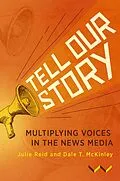Focusing on three South African communities the authors dismiss the idea that some groups are voiceless, arguing that they are being deliberately ignored by dominant news media
The dominant news media are often accused of reflecting an 'elite bias', privileging and foregrounding the interests of a small segment of society while ignoring the narratives of the majority. The authors of Tell Our Story investigate this problem and offer a hands-on demonstration of listening journalism and research in practice. In the process they dismiss the idea that some groups are voiceless, arguing that what is often described in such terms is mostly a matter of those groups being deliberately ignored. Focusing their attention on three very different South African communities they delve into the life and struggle narratives of each, exposing the divide between the stories told by the people who actually live in the communities and the way in which those stories have been understood and shaped by the media. The three communities are those living in the Glebelands hostel complex in Durban where over 100 residents have been killed in politically motivated violence in the past few years; the Xolobeni community on the Wild Coast, which has been resisting the building of a new toll road and a dune mining venture; and Thembelihle, a settlement south-west of Johannesburg that has been resisting removal for many years. The book concludes with a set of practical guidelines for journalists on the practice of listening journalism.
Autorentext
Julie Reid is Associate Professor in the Department of Communication Science at the University of South Africa.
Klappentext
The dominant news media is often accused of reflecting an 'elite bias', privileging and foregrounding the interests of a small segment of society, while ignoring the narratives of the majority. Tell Our Story investigates the problem of disproportionate media representation and offers a hands-on demonstration of listening journalism and research in practice to promote a more active engagement between journalists and local communities. In the process the authors dismiss the idea that some groups are voiceless, arguing that what is often described is a matter of those groups being deliberately ignored. The authors focus on three communities in South Africa, each presenting with differing but crucial historical, geographical and socio-political 'characteristics' of the post-1994 period. Adopting an audience-centred approach, the authors delve into the life and struggle narratives of each community. They expose the divides between the stories as told by the people in the community who have lived experience of these events, and the way in which these stories are understood and shaped by the media. The implications of the media's routine misrepresentation of the voices of the marginalised and poor for media diversity, media credibility and ethics, media education and training, as well as media research are unpacked and the authors offer a useful set of practical guidelines for journalists on the practice of listening journalism.
Inhalt
List of Figures
Acknowledgements
Abbreviations and Acronyms
Chapter 1 The Importance of Voice and the Myth of the 'Voiceless' - Julie Reid
Part 1 From the Inside: Voice(s) from the Ground
Chapter 2 Community Perspective, Experience and Voice - Julie Reid and Dale T. McKinley
Chapter 3 Glebelands Hostel, Durban - Dale T. McKinley
Chapter 4 Xolobeni, Eastern Cape - Dale T. McKinley
Chapter 5 Thembelihle Community, Johannesburg - Dale T. McKinley
Part 2 From the Outside: Dominant Voice
Chapter 6 Dominant Media Telling and Elite Communication - Dale T. McKinley
Chapter 7 The Political Economy of Dominant Power and Storytelling - Dale T. McKinley
Part 3 New Trajectories for Journalism and Voice(s)
Chapter 8 Media Diversity and Voice(s) - Julie Reid
Chapter 9 Rethinking Media Freedom, Revamping Media Ethics - Julie Reid
Chapter 10 Planting the Seeds of Change - Julie Reid
Notes
Bibliography
Index
